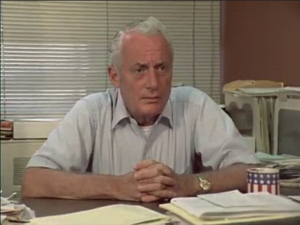William Corson
(officer, spook, academic) | |
|---|---|
 | |
| Born | 25th September, 1925 Chicago, Illinois, USA |
| Died | 17th July, 2000 (Age 74) Virginia, USA |
Cause of death | lung cancer |
| Alma mater | University of Chicago, University of Miami, American University, Naval Intelligence School |
| Interests | • spooks • KGB • counterinsurgency |
Spook and counterinsurgency expert who became became critical of the "American intelligence empire". Unofficial adviser to Frank Church and the Senate Intelligence Activities Committee. | |
William Raymond Corson was an American author and a retired Lieutenant Colonel in the United States Marine Corps. He was an expert on counterinsurgency warfare and served the majority of his career as an intelligence officer on special assignment with the Central Intelligence Agency.
After his retirement, Corson became critical of the "American intelligence empire". Corson also worked as an unofficial adviser to Frank Church and the Select Committee to Study Governmental Operations with Respect to Intelligence Activities.[1]
Education and military service
Corson was born in Chicago. For university, he enrolled at the University of Chicago until 1942, when he enlisted in the US Marine Corps on 12 December. He saw combat on Guam and Bougainville. After the war he pursued higher education again, obtaining a master’s degree in business and economics from the University of Miami and later a doctorate in economics from American University.[2]
In 1949, Corson joined the U.S. Marine Corps as a commissioned officer and served in the Korean War in 1952. From 1953 to 1955 he was a student at the Naval Intelligence School in Washington, studying the Chinese language. He was later made a liaison officer in Hong Kong from 1958 to 1962.[2] He worked with British, Korean and Japanese intelligence services.[3]
After this he was assigned to the office of the secretary of defense, specializing in Asian affairs. In this role, Corson gained contacts at the highest level U.S. decision making in regards to the war in Southeast Asia.
Corson became an instructor at the U.S. Naval Academy, teaching a course on Communism and the Revolutionary War from 1964 to 1966. He later taught history at Howard University for a year.[2]
Corson was sent to Vietnam in 1966, initially commanding a Marine Corps tank battalion before being given command of the Combined Action Program (CAP) the following year. The CAP officially was there to provide security from communist insurgents and worked to gain the trust of the local Vietnamese population, but was massively corrupt. According to an official Marine Corps history the program was highly successful, and Corson won the praise of his superiors. Later he described the mismanagement and corruption in his writings.
Returning to the United States in 1967, he was given another sensitive assignment as deputy director of the Southeast Asia Intelligence Force, a role in which he worked closely with the Central Intelligence Agency.
Corson also worked as an unofficial adviser to Frank Church and the Select Committee to Study Governmental Operations with Respect to Intelligence Activities.[1]
Writing career
Corson retired in 1968, and subsequently began his career writing books. For several years, he wrote a column on veterans affairs for Penthouse Magazine, serving as the publication’s Washington editor.
Books
- ''The Betrayal''. New York: W. W. Norton & Co. (1968)
- ''Promise or Peril: The Black College Student in America''. New York: W. W. Norton & Co. (1970)
- ''Consequences of Failure''. New York: W. W. Norton & Co. (1973)[4]
- ''New KGB: Engine of Soviet Power'', with R. Crowley. New York: William Morrow & Co. (1985)
- ''The Armies of Ignorance: The Rise of the American Intelligence Empire''. New York: Dial Press/J. Wade (1986)
- ''Widows'', with Susan B. Trento and Joseph J. Trento. New York: Crown Publishers (1989) The book includes an account of the life and death of John Paisley.
References
- ↑ a b http://spartacus-educational.com/JFKcorsonW.htm
- ↑ a b c https://archive.today/20200127212615/https://www.washingtonpost.com/archive/local/2000/07/19/william-r-corson-74-author-and-retired-marine-officer-dies/f164a009-cb4f-4238-a710-2b7bbe72f719/
- ↑ https://archive.org/details/armiesofignoranc008072/page/n663/mode/2up
- ↑ Bacher, Jeffrey P. (Mar./Apr. 1974). Review of Consequences of Failure, by William R. Corson. Naval War College Review, vol. 26, no. 5, pp. 103-104. Template:JSTOR.